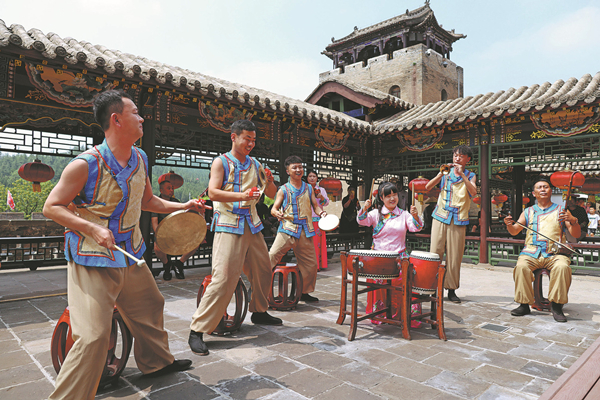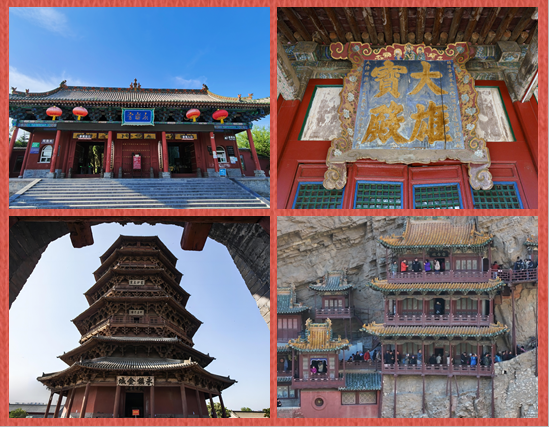Jincheng poised to become model city for tourism
Party chief outlines plan for developing the scenic area in Shanxi province

Performers play traditional music for tourists at the House of the Huangcheng Chancellor in Jincheng, Shanxi province, on July 13. ZHU XINGXIN/CHINA DAILY
Blessed with an array of historical and cultural treasures and a pristine natural environment, Jincheng in Shanxi province is poised to become a model city for cultural tourism and health, the city's top official said.
"Cultural tourism and health preservation represent a new frontier of consumption and a key driver of growth," said Wang Zhen, Party secretary of Jincheng, adding that the city is on the brink of a remarkable transformation, with vast opportunities and tremendous potential.
The city boasts a rich cultural heritage, with 40 nationally acclaimed historical and cultural towns and villages, putting it at the forefront of cultural development nationwide and laying a solid foundation for tourism growth. For example, it has 186 traditional ancient villages, the most in Shanxi and the fifth-most in China. In addition, the Qinhe River basin houses 117 ancient mansions and 150,000 dwellings from the Ming and Qing dynasties (1368-1911).
Recently, the online action video game Black Myth: Wukong has sparked a surge in visits to ancient buildings in the city. Attractions such as the Yuhuang Temple, or Jade Emperor Temple, have become extremely popular.
The city's GDP growth has ranked first in the province for three consecutive years, with an average annual rate of 8 percent over the past four years. Per capita GDP reached 107,000 yuan ($15,140) last year, maintaining the top position in the province and exceeding the national average by nearly 20,000 yuan.
In addition, Jincheng is located in the golden habitable belt at 35 degrees north latitude, with a forest coverage rate of 40.3 percent and an average annual temperature of 11 C, yielding a tourism period that lasts as long as seven months, Wang said.
It has been awarded the title of "World Healthy & Positive Aging City" by the International Institute on Aging United Nations-Malta.
"Developing the health and wellness industry is the most powerful lever for promoting rural vitality," Wang said, adding that the integrated development of cultural tourism, the health and wellness industry and rural projects has become a major feature of Jincheng's overall high-quality growth.
Among the major projects, the Fengcheng Health and Wellness Demonstration Zone has been selected as one of the first such cultural tourism and health zones in the province. It is adjacent to an urban area, with a planned area of 60 square kilometers and an estimated investment of about 8 billion yuan, making it a key project for the development of the health and wellness industry in Jincheng.
Its core functional area is located in the coal mine subsidence and treatment area of the former Gangue Mountain, which has become a preferred one-stop tourist destination for residents and visitors.
Jincheng has continued to improve related rich products and services that cover various levels from demonstration zones to major scenic spots and high-quality travel routes, which Wang characterized as "efforts to develop cultural tourism and health and wellness into a strategic pillar industry and a source of well-being for the people".
Major scenic spots like Wangmangling have been upgraded, 129 beautiful villages and 108 traditional courtyards have been selected to create health and wellness villages, and a 582-kilometer main line of the Taihang No 1 Tourist Road and a 155-kilometer branch line have been completed.
The Taihang No 1 Rural Vitalization Demonstration Belt, centered on this road, covers 90 percent of the city's scenic spots and 90 percent of the area's regions that have been lifted out of poverty. It has subsequently attracted more than 20 million visits cumulatively.
More than 81,000 local residents have worked in related service sectors, which has increased income for some 500,000 villagers, according to the city government.
Wang said that in the future, Jincheng will accelerate the construction of 200 boutique demonstration villages, upgrade around 1,000 villages and build 20 boutique areas.
"We hope to explore new paths and share our experience in the integrated development of the cultural tourism and health and wellness industry in Shanxi and even across the country," Wang said.



